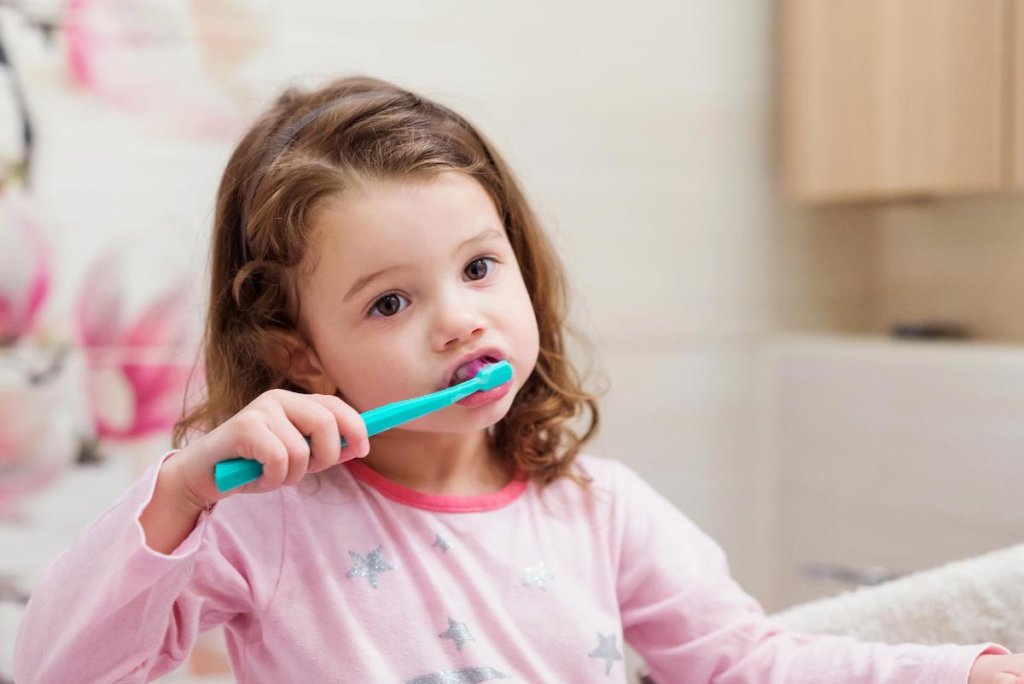The best dentists recommend teaching children good oral health habits even before their teeth come in. You can establish these habits during infancy by gently wiping your baby’s gums every night with a soft, damp cloth.
When their teeth start growing in (usually around six months), you can switch to a baby toothbrush. Introduce flossing once their teeth start touching, generally around the time they turn two or three years old.
When teaching good oral habits, it’s important to remember that kids learn by example. If you want your kid to brush their teeth every night, they will most likely pick up that habit from you.
What happens if a child doesn’t develop early oral hygiene habits?
Poor oral hygiene habits can cause dental problems that can have lasting effects on your child’s life. These problems can persist well into adulthood, making it more difficult for them to correct those habits and the associated oral health problems.
To emphasize this point, here are six common dental problems found in children with poor oral hygiene.
1. Tooth Decay
The most immediate effect of poor oral hygiene is tooth decay. Though thoroughly preventable with proper and regular toothbrushing, dental visits, and proper food choices, many children struggle to develop these habits early on and go on to suffer from cavities.
According to data from the Centers for Disease Control and Prevention, about 25% of children ages 5 to 11 years old have at least one untreated case of tooth decay. For adolescents ages 12 to 19, the number is 13%; and for adults, it is 26%.
When cavities develop, dentists can repair the damage by drilling out the decay and filling the enamel hole with dental fillers. However, this only works if the decay is detected early while it is small. If the affected tooth doesn’t have enough unaffected surface left for the fillings to bond to, then your dentist will have to extract it.
Besides the searing pain experienced when the decay irritates the nerves underneath your teeth, the unfortunate consequence of tooth decay is chronic bad breath—which is also known as halitosis. Having chronic bad breath can cause socialization problems, which may result in children being unable to develop a bond with their peers!
2. Tooth Sensitivity
Tooth sensitivity can cause children to lose focus, as most of their attention will be on the unpleasant sensations on their teeth. There are many factors to this, but these are typically caused by worn tooth enamel, tooth decay, or gum disease.
If the cause of tooth sensitivity seems to be dental, then it’s essential to visit your dentist immediately. Your local family dentist’s office will perform a series of tests on your child’s teeth, make an accurate diagnosis, and will recommend effective treatment options and lifestyle changes.
3. Gum Disease
Oral health is not just about keeping your teeth healthy and strong; your gums need some attention too! Healthy gums will give way to healthier teeth because your gums provide a tight seal around your teeth, preventing plaque and bacteria from finding a home there.
Gum disease starts with plaque building up along the gum line, causing an infection that hurts both the gums and the bone. The most common symptom of gum disease is bleeding during toothbrushing.
Other signs of gum disease include inflammation, tenderness, and a red and swollen appearance. Gum diseases, like gingivitis, can also result in halitosis and loose permanent teeth. Like tooth decay, gum disease is easily prevented by regular and proper toothbrushing and flossing, with regular visits to your family dentist.
4. Orthodontic Issues
Orthodontic issues like overbites, underbites, open bites, and spacing problems are sometimes a product of genetics, but they can also be caused by behavioral factors like thumb or finger sucking. And without good oral hygiene habits, such as seeing a dentist twice a year, the issues are sure to progress well into adulthood. Meanwhile, your child may develop social anxiety as a result of their poor oral health conditions.
Orthodontic issues can be corrected by cosmetic dentistry procedures, such as orthodontic braces and Invisalign aligners. The earlier you can detect these dental issues, the simpler and less costly the procedures will be!
5. Dental Anxiety
Dental anxiety can get in the way of achieving healthy oral habits. Like all other items on this list, this fear can last well into adulthood—making any preexisting dental health problems worse due to a lack of professional care. To prevent this fear from taking hold early in your child’s life, its best to make visits to the dentist a fun and relaxing experience, something we’re pros at in our dental office.
Choosing a dental office with proven experience in working with children, like our Anderson Dental Care team, and visiting their office starting when your child is between one and two years old will help start your child off with positive dental experiences. You can also encourage the child by providing incentives in exchange for cooperation during dental visits. Most importantly, you should teach your children the importance of good dental habits by setting a good example!
6. Dental Emergencies
Dental emergencies can happen at any time. Teeth might chip, break, or crack due to sports activities, through plain roughhousing with friends, or simply biting into something hard or sticky. Your kid can even damage their teeth by using it for purposes other than eating, such as using it to open a bottle cap.
In particularly severe circumstances, the kid may lose a tooth entirely. If your kid lost a primary tooth, then there’s no cause for worry as their permanent teeth will soon replace it. However, a kid losing a permanent tooth is another story.
As soon as this happens, call an emergency dentist to see if they can reattach the tooth. Make sure to secure the broken tooth, soak it in milk, and visit the dentist immediately. The chances of reattaching a knocked out tooth are highest in young children. In ideal circumstances, your dentist might be able to save the tooth by slipping the tooth back into place and securing it with soft wire.
In most situations, there isn’t much that a parent can do to prevent dental emergencies. However, if your child understands the value of their dental health, they will find ways to avoid such troubles on their own. If you’re worried, then you can encourage your child to wear a mouthguard to protect themselves when playing rough contact sports.
Conclusion
Good oral health is a product of good oral hygiene habits. If you teach children the importance of brushing and flossing their teeth at an early age, and help them do it, they will most likely bring this habit well into their adult years. Unfortunately, many parents let their children lose primary teeth to cavities and other oral problems, thinking that they can just start over when the permanent teeth come in.
This practice causes a lot of problems in the future for the child. This is because oral habits don’t just end with the teeth—oral health can affect other aspects of your health as well. The best way to prevent these problems is by teaching good oral health habits early, even before their teeth come in.
Are you looking for a dentist office near you to start teaching your child about the basics of oral hygiene? Anderson Dental Care is a family dental care facility in Cincinnati, Ohio. Our wide array of services include dental cleanings, fillings, crowns, dental bridges, and teeth whitening, and more. Get in touch with us and schedule an appointment today!

